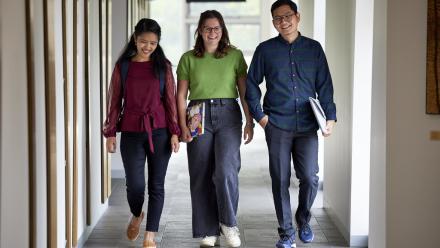We only have one planet, let’s take care of it
Pause for a moment, think about some of the most pressing environmental problems facing humanity and then think about what we can do as individuals to protect our environment.
We only have one planet, let’s take care of it.
‘Only One Earth’ – it’s the powerful theme of this year’s World Environment Day, celebrated earlier this month on 5 June.
Led by the United Nations Environment Programme since 1973, the day has become the largest global platform for environmental awareness and outreach.
This year’s focus is on ‘living sustainably in harmony with nature’, and academics at the ANU Fenner School of Environment & Society are promoting this message to our community.
World Environment Day has always been special to Professor David Lindenmayer, a world-leading expert in forest ecology and resource management, as it highlights why protecting the environment is so important.
“There is only one planet Earth and we must work much harder to look after it – there is no planet B that we can go to if we wreck this one,” David says.
David’s key message to the ANU community is that if enough people care and take action, then things can and do change and we can make the world a better place.
“Despite the damage caused by bushfires, floods and COVID-19 – the world is still a beautiful place and there is more good than evil,” he says.
“Conserving the planet’s natural environments is an important task to which we can all contribute.”
Similarly, Distinguished Professor Xuemei Bai, a renowned expert in urban sustainability science, celebrates the significance of World Environment Day.
“Personally, [the day] is always a reminder of the enormity of the environmental and sustainability challenges we are facing and the urgency in taking actions to change the current trajectory,” Xuemei says.
In relation to this year’s theme, Xuemei identifies an important link to her current research.
“This theme of ‘Only One Earth’ is particularly relevant to my work. Cities can and must be the champions in global sustainability. As part of The Earth Commission, I am leading a working group to explore cross-scale translation to better link cities and businesses to planetary-level boundaries of Earth system functions.”
This World Environment Day, Xuemei is sending the following message to the ANU community:
“Pause for a moment, think about some of the most pressing environmental problems facing humanity and then think about what we can do as individuals to protect our environment,” Xuemei says.
“Perhaps most importantly, pay attention to and get involved in what your city, state, and national governments are doing for the environment and sustainability. These groups have the power to make the structural changes that can make our environmentally conscious individual choices not only possible but also much easier to make.”
In 2022, the Fenner School of Environment & Society celebrates its 15th anniversary.
One of the longest-standing and most influential centres for cross-disciplinary environmental research and education, the Fenner School includes experts from a diverse range of fields working together to tackle the world’s biggest environmental challenges.
For more information on the School’s 15th anniversary event series, please visit https://fennerschool.anu.edu.au/news-events/15-years-fenner.
Other stories you might like to read
Page Owner: ANU Communications & Engagement
